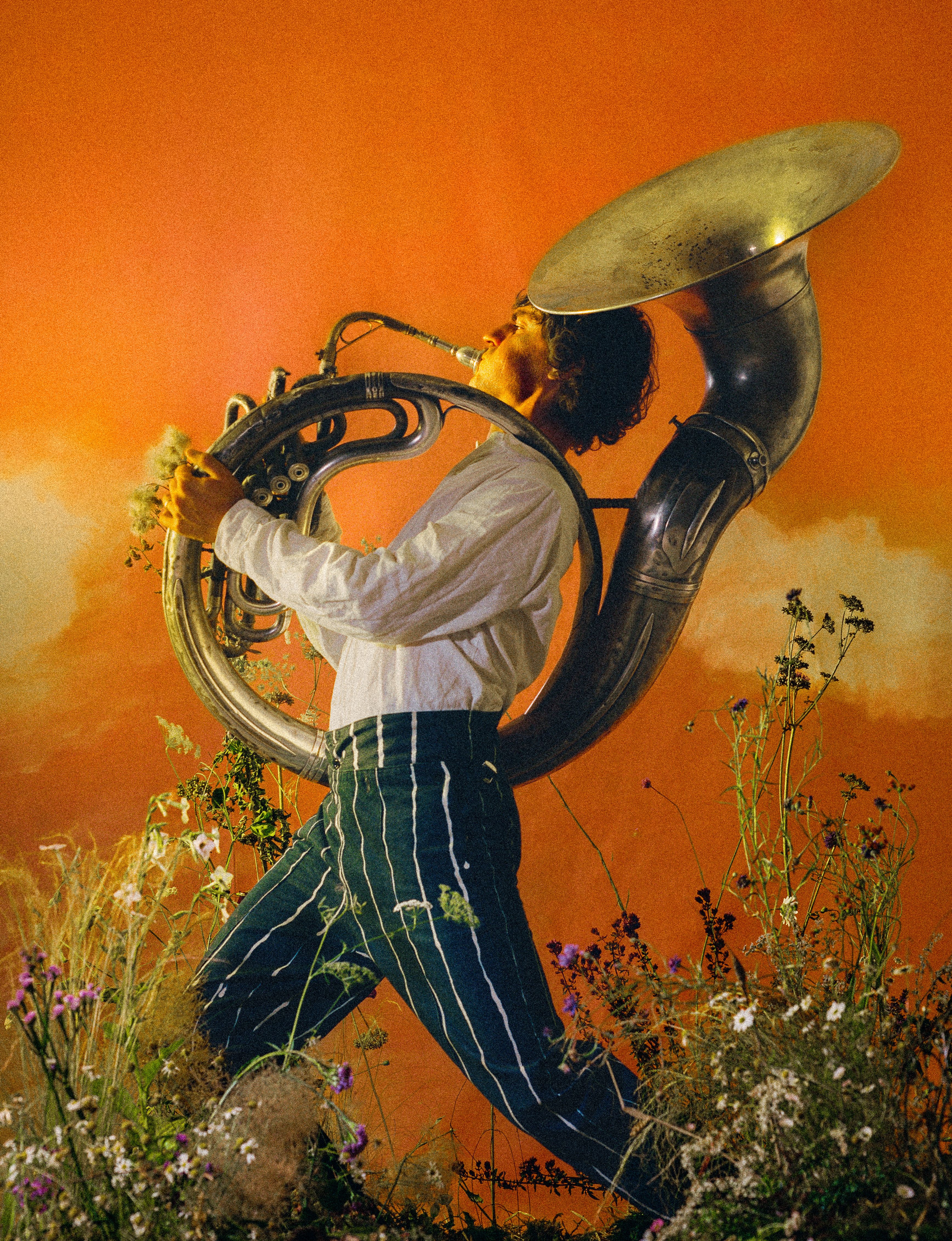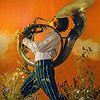Name: Cosmo Sheldrake
Occupation: Musician, multi-instrumentalist, composer, producer
Nationality: British
Recent release: Cosmo Sheldrake's new album Eye to the Ear is out via Tardigrade.
Recommendations on the topic of sound: I love the book by Murray Schaffer, The Soundscape, it is a sort of history of sound and a call to the ears. It definitely changed the way I listen to things.
Also maybe Bernie Krause, The Great Animal Orchestra, and possibly Ocean of Sound by David Toop.
If you enjoyed this Cosmo Sheldrake interview and would like to stay up to date with his music, visit his official homepage. He is also on Instagram, and Facebook.
When I listen to music, I see shapes, objects and colours. What happens in your body when you're listening? Do you listen with your eyes open or closed?
That completely depends on where I am and what I am listening to.
But if I am on my own and listening very intently then I often close my eyes. I have a fairly visual imagination and I think it helps to focus it if I shut my eyes.
How do listening with headphones and listening through a stereo system change your experience of sound and music?
Again, it totally depends on the music and the purpose for listening. I love listening to headphones when I am out and about traveling on public transport because of the way you feel cocooned in your own little world, there is something lovely about the privacy of that.
But I prefer to listen loudly through speakers when given a choice.
Tell me about some of the albums or artists that you love specifically for their sound, please.
I love a band called Jam Money, and their album Gathering Kind. They have a wonderfully rough and ready DIY sound.
Also, I love the sound of the band Dubi Dolczek, their album Dubi in Space Part Two: Voyage to the Cat’s Paw Nebula is all recorded to tape and is just very creamy.
Do you experience strong emotional responses towards certain sounds? If so, what kind of sounds are these and do you have an explanation about the reasons for these responses?
Absolutely. The sound of a group of swifts hurtling past is the sound of the spring and the summer for me and reminds me of a very particular place that I used to visit in spring when I was a child.
There can be sounds which feel highly irritating to us and then there are others we could gladly listen to for hours. Do you have examples for either one or both of these?
Yes. I could listen to the sound of a gurgling stream or river for hours and hours as I can always hear new patterns and melodies in it. After a long time, you begin to hear voices.
Are there everyday places, spaces, or devices which intrigue you by the way they sound? Which are these?
I have all sorts of listening devices that allow me to listen to sounds that are often imperceptible but commonplace. Like a bat detector that allows me to listen to echolocating bats, and an electromagnetic coil pickup that allows me to hear the electromagnetic smog that we are all bathed in much of the time.
Also, a very sensitive contact microphone that was built for listening to insects with. I am also intrigued by radio astronomy and the idea of being able to listen to sounds from space.
Have you ever been in spaces with extreme sonic characteristics, such as anechoic chambers or caves? What was the experience like?
I love being in resonant or reverberant natural spaces like caves or fjords. Places that make amazing echoes fascinate me.
I also try to collect recordings of places like this as it is possible to model the decay and to essentially sample the natural reverbs or echoes.
What are among your favourite spaces to record and play your music?
I love performing music outdoors in wild places.
The idea of being able to add to the existing, more-than-human soundscape in a generative or playful way appeals to me. 
Cosmo Sheldrake Interview Image by Jack Thompson-Roylance
Do music and sound feel “material” to you? Does working with sound feel like you're sculpting or shaping something?
They feel very material to me.
My dad Rupert and my brother Merlin have done a lot of experiments with cymatics, vibrating liquids with different frequencies and studying the resulting patterns that emerge – which demonstrates very clearly the materiality of sound and its role in the creation of form.
Sound is also inherently connected to the places that it comes from, you can separate sounds from their source (schizophonia) but they will always carry a watermark or signature of the place they came from or the creature who made them.
How important is sound for our overall well-being and in how far do you feel the "acoustic health" of a society or environment is reflective of its overall health?
A healthy sound environment is essential for well-being, not just among humans but for the world at large. Noise pollution in the oceans for example can have a devastating effect on cetaceans and fish communities and for whole ecosystems.
One amazing example of the power of healthy soundscapes is the work of biologist Steve Simpson, who is playing recordings of healthy coral reefs to degraded ones, and finding that it encourages the fish to return, who graze on the algae that was smothering it and can often result in the reef regenerating.
I have always been intrigued by the old ideas of the health of a society being revealed through the nature of its music, and to a certain extent can't help but sympathize with this sentiment.
Sound, song, and rhythm are all around us, from animal noises to the waves of the ocean. What, if any, are some of the most moving experiences you've had with these non-human-made sounds?
Maybe once when I was lying down listening to a skylark after camping in Dartmoor and the skylark became liquid drum and bass in my mind, and I was lying on the floor dancing like crazy to this skylark and the cows nearby were making the bass. It was quite amazing.
Also just listening to the dawn chorus in April and May is one of the more magical experiences.
Many animals communicate through sound. Based either on experience or intuition, do you feel as though interspecies communication is possible and important? Is there a creative element to it, would you say?
I think it happens all the time. There are many musical traditions that contain interspecies communicative elements, for example, Kulning in Sweden. It's a kind of singing that also is a form of communicating with goats. And there is definitely a creative element to it.
Also, I think some cetaceans might be able to understand parts of each other's languages. Likewise, one species of bird will often incorporate elements of other species’ songs.
The work of organisations like Project Ceti are also beginning to raise the possibility of being able to translate sperm whale language using machine learning algorithms.
Tinnitus and developing hyperacusis are very real risks for anyone working with sound. Do you take precautions in this regard and if you're suffering from these or similar issues – how do you cope with them?
I try to avoid listening to things too loudly for too long. But it is hard, as the tendency is always to creep the volume up.
We can surround us with sound every second of the day. The great pianist Glenn Gould even considered this the ultimate delight. How do you see that yourself and what importance does silence hold?
I need periods of quiet just to rest the ears apart from anything else. It gets tiring listening to things all of the time.
But I also love sounds and music wafting around the place.
Seth S. Horowitz called hearing the “universal sense” and emphasised that it was more precise and faster than any of our other senses, including vision. How would our world be different if we paid less attention to looks and listened more instead?
Well that sounds like music to my ears. I suppose my album is called Eye to the Ear with that sort of progression in mind.
There is a great little book called The Eyes of the Skin by Juhani Pallasmaa, where he writes very beautifully about sound and the need to overthrow ocularcentrism. He has a lovely line;
“Sight isolates, whereas sound incorporates; vision is unidirectional, whereas sound is omni-directional ... Sight is the sense of the solitary observer, whereas hearing creates a sense of connection and solidarity.” (p. 49-50, The Eyes of the Skin)





